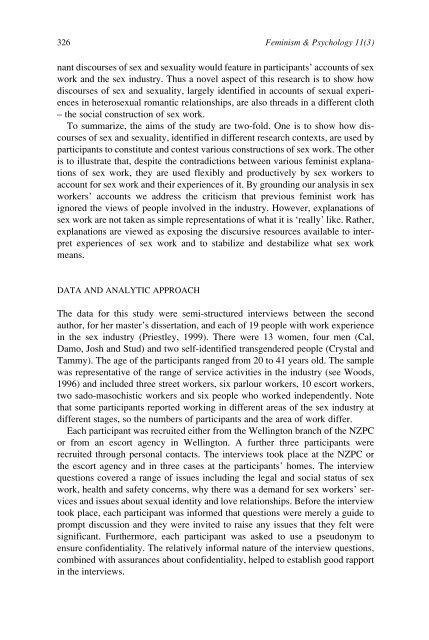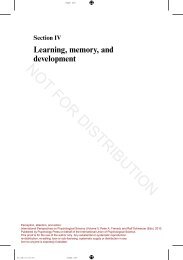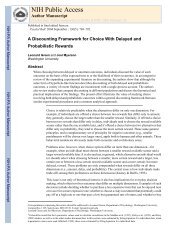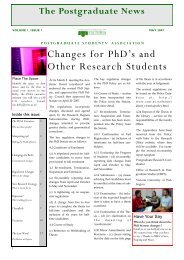A Feminist Discourse Analysis of Sex 'Work' - of /courses - Victoria ...
A Feminist Discourse Analysis of Sex 'Work' - of /courses - Victoria ...
A Feminist Discourse Analysis of Sex 'Work' - of /courses - Victoria ...
You also want an ePaper? Increase the reach of your titles
YUMPU automatically turns print PDFs into web optimized ePapers that Google loves.
326 Feminism & Psychology 11(3)<br />
nant dis<strong>courses</strong> <strong>of</strong> sex and sexuality would feature in participants’ accounts <strong>of</strong> sex<br />
work and the sex industry. Thus a novel aspect <strong>of</strong> this research is to show how<br />
dis<strong>courses</strong> <strong>of</strong> sex and sexuality, largely identified in accounts <strong>of</strong> sexual experiences<br />
in heterosexual romantic relationships, are also threads in a different cloth<br />
– the social construction <strong>of</strong> sex work.<br />
To summarize, the aims <strong>of</strong> the study are two-fold. One is to show how dis<strong>courses</strong><br />
<strong>of</strong> sex and sexuality, identified in different research contexts, are used by<br />
participants to constitute and contest various constructions <strong>of</strong> sex work. The other<br />
is to illustrate that, despite the contradictions between various feminist explanations<br />
<strong>of</strong> sex work, they are used flexibly and productively by sex workers to<br />
account for sex work and their experiences <strong>of</strong> it. By grounding our analysis in sex<br />
workers’ accounts we address the criticism that previous feminist work has<br />
ignored the views <strong>of</strong> people involved in the industry. However, explanations <strong>of</strong><br />
sex work are not taken as simple representations <strong>of</strong> what it is ‘really’ like. Rather,<br />
explanations are viewed as exposing the discursive resources available to interpret<br />
experiences <strong>of</strong> sex work and to stabilize and destabilize what sex work<br />
means.<br />
DATA AND ANALYTIC APPROACH<br />
The data for this study were semi-structured interviews between the second<br />
author, for her master’s dissertation, and each <strong>of</strong> 19 people with work experience<br />
in the sex industry (Priestley, 1999). There were 13 women, four men (Cal,<br />
Damo, Josh and Stud) and two self-identified transgendered people (Crystal and<br />
Tammy). The age <strong>of</strong> the participants ranged from 20 to 41 years old. The sample<br />
was representative <strong>of</strong> the range <strong>of</strong> service activities in the industry (see Woods,<br />
1996) and included three street workers, six parlour workers, 10 escort workers,<br />
two sado-masochistic workers and six people who worked independently. Note<br />
that some participants reported working in different areas <strong>of</strong> the sex industry at<br />
different stages, so the numbers <strong>of</strong> participants and the area <strong>of</strong> work differ.<br />
Each participant was recruited either from the Wellington branch <strong>of</strong> the NZPC<br />
or from an escort agency in Wellington. A further three participants were<br />
recruited through personal contacts. The interviews took place at the NZPC or<br />
the escort agency and in three cases at the participants’ homes. The interview<br />
questions covered a range <strong>of</strong> issues including the legal and social status <strong>of</strong> sex<br />
work, health and safety concerns, why there was a demand for sex workers’ services<br />
and issues about sexual identity and love relationships. Before the interview<br />
took place, each participant was informed that questions were merely a guide to<br />
prompt discussion and they were invited to raise any issues that they felt were<br />
significant. Furthermore, each participant was asked to use a pseudonym to<br />
ensure confidentiality. The relatively informal nature <strong>of</strong> the interview questions,<br />
combined with assurances about confidentiality, helped to establish good rapport<br />
in the interviews.






